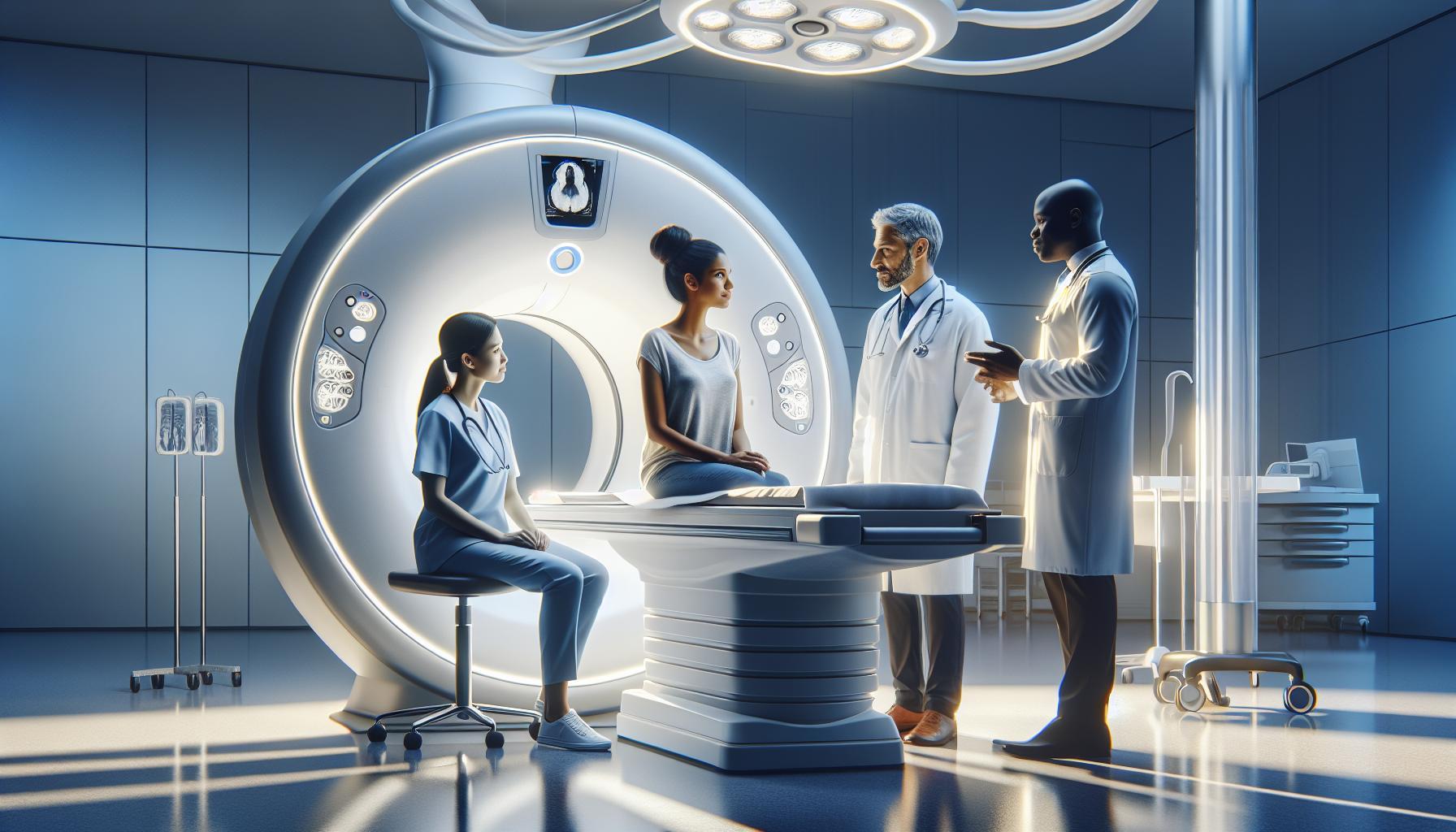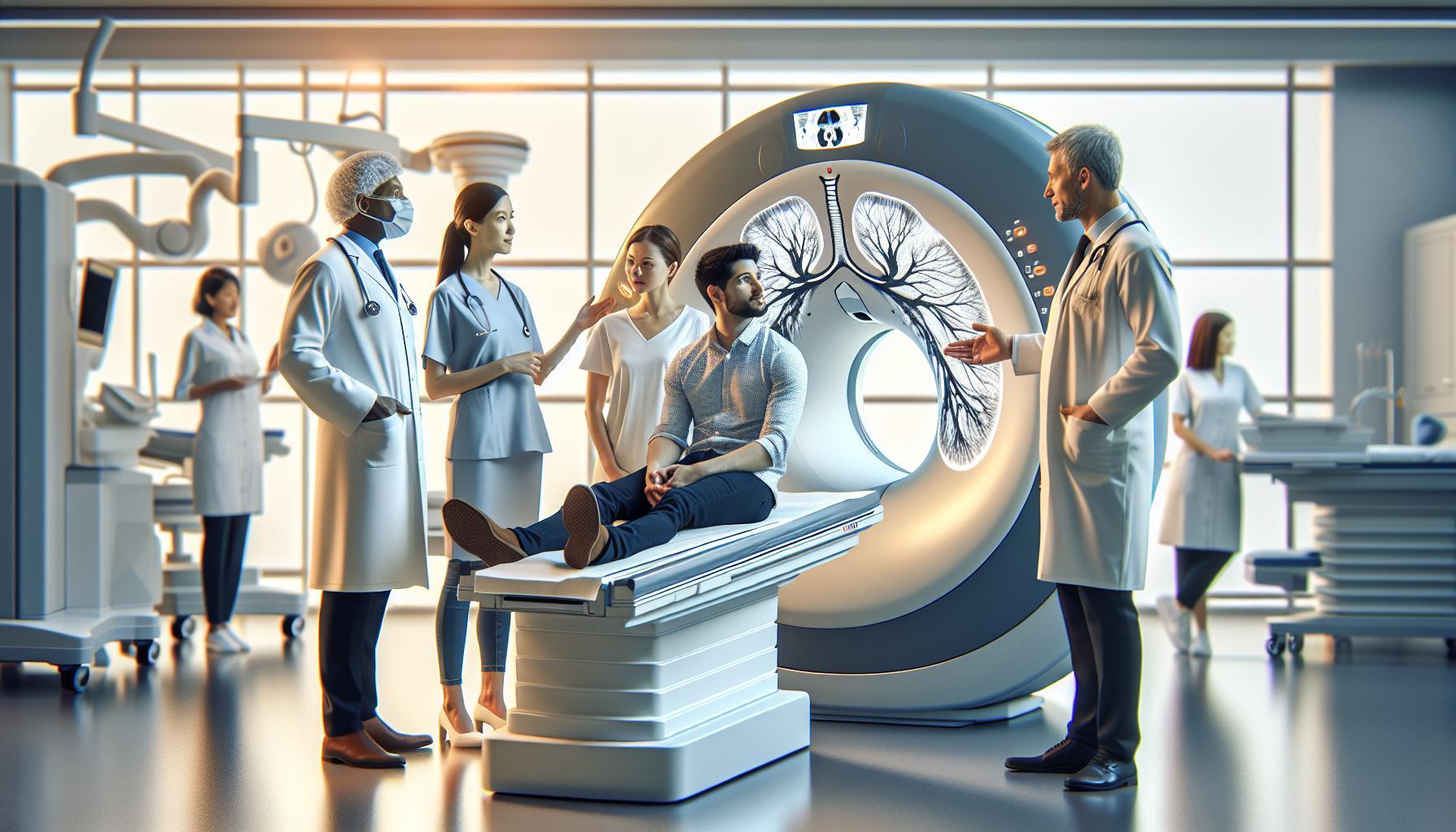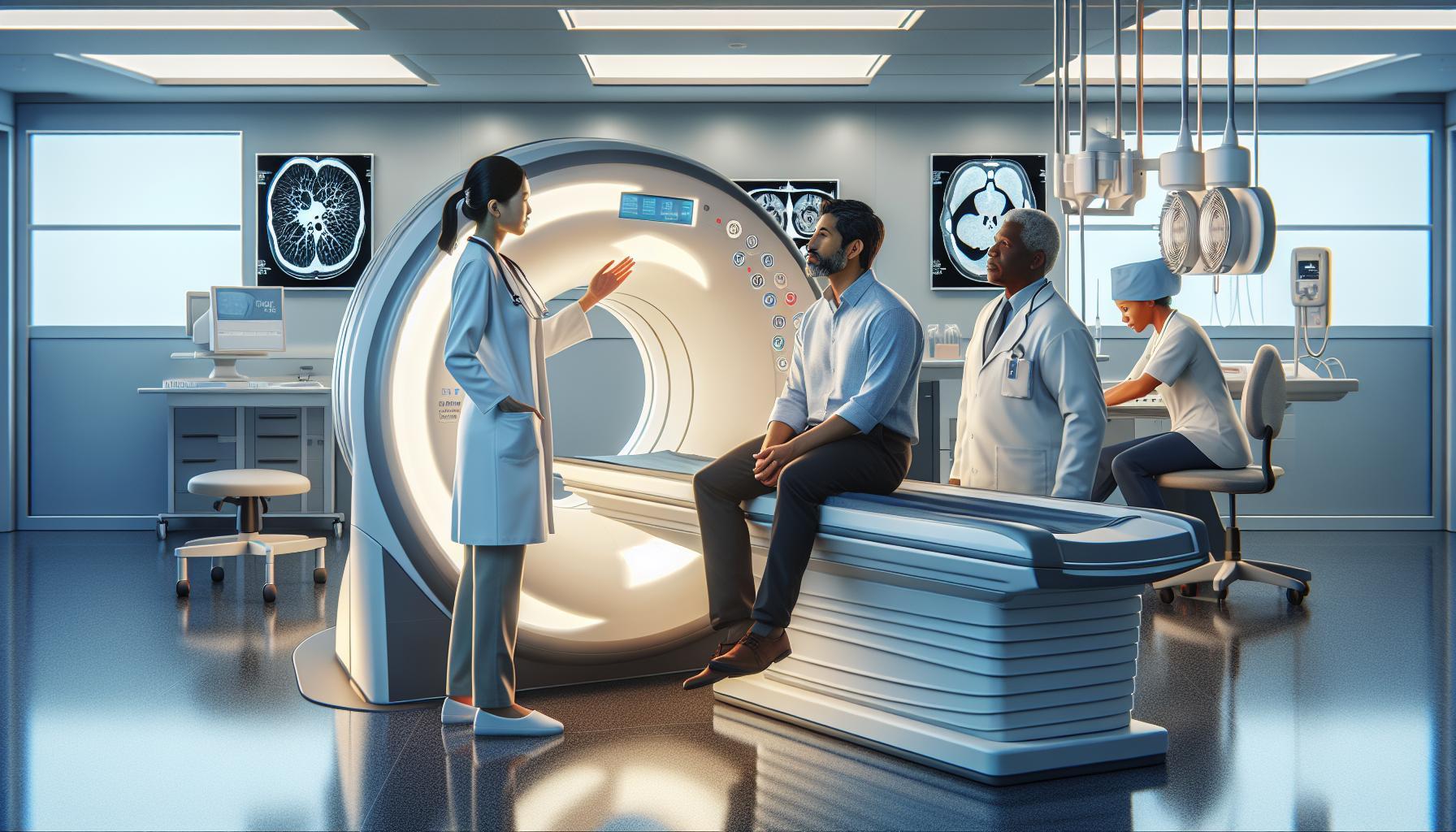Multiple sclerosis (MS) is a complex neurological condition that often leaves patients and their families searching for answers. Did you know that while magnetic resonance imaging (MRI) is the gold standard for diagnosing MS, computed tomography (CT) scans can also play a role in its detection? Understanding how these imaging methods work can empower you to make informed decisions about your health.
CT scans provide valuable insights by capturing cross-sectional images of the brain, helping to identify lesions or abnormalities linked to MS. For those concerned about symptoms like vision problems, fatigue, or numbness, exploring how CT imaging contributes to MS detection is crucial. As you read on, you’ll discover important information about the capabilities of CT scans in diagnosing MS, what to expect during the procedure, and how this knowledge can guide your conversations with healthcare professionals. Stay curious-this could be the key to understanding your health journey better.
Understanding the Role of CT Scans in MS Diagnosis
CT scans are a common diagnostic tool in the medical field, playing a crucial role in the evaluation of various neurological conditions, including Multiple Sclerosis (MS). While they are not the primary method for diagnosing MS, they can provide valuable insights to healthcare professionals. CT scans utilize X-rays to create detailed cross-sectional images of the brain and spine, offering a view of the structures that may harbor lesions or other abnormalities associated with MS. Understanding how CT scans fit into the broader context of MS diagnosis can help demystify the process for patients and their families.
When patients present symptoms such as weakness, numbness, vision problems, or cognitive changes, physicians may recommend imaging studies to assess potential causes. Although an MRI is generally preferred for pinpointing demyelinating lesions typical of MS, a CT scan can help rule out other medical issues that may mimic MS symptoms, such as tumors, vascular lesions, or brain injuries. By excluding these conditions, a CT scan aids in narrowing down the diagnostic possibilities, leading to a more focused and effective treatment plan.
It’s essential to recognize that while CT scans can reveal structural abnormalities, they are limited in their ability to detect subtle changes in brain tissue, particularly those characteristic of MS. The lesions associated with MS often do not show as clearly on CT compared to MRI images, which are sensitive to the presence of black holes or plaques within the brain matter. Therefore, while a CT scan can be a valuable tool in the diagnostic process, it should be viewed as part of a comprehensive evaluation that may include MRI scans, neurological examinations, and laboratory tests.
For patients preparing for a CT scan, the experience is typically straightforward and quick, taking only a few minutes to complete. It is important to communicate any concerns with the healthcare team, especially regarding previous allergies to contrast dyes or kidney issues. Informed patients will find the experience less daunting, enabling them to participate actively in their diagnostic journey and ultimately their treatment strategy. As with any medical procedure, discussing results with a healthcare provider is vital, as they can offer clarity and insight into the implications for MS diagnosis and management.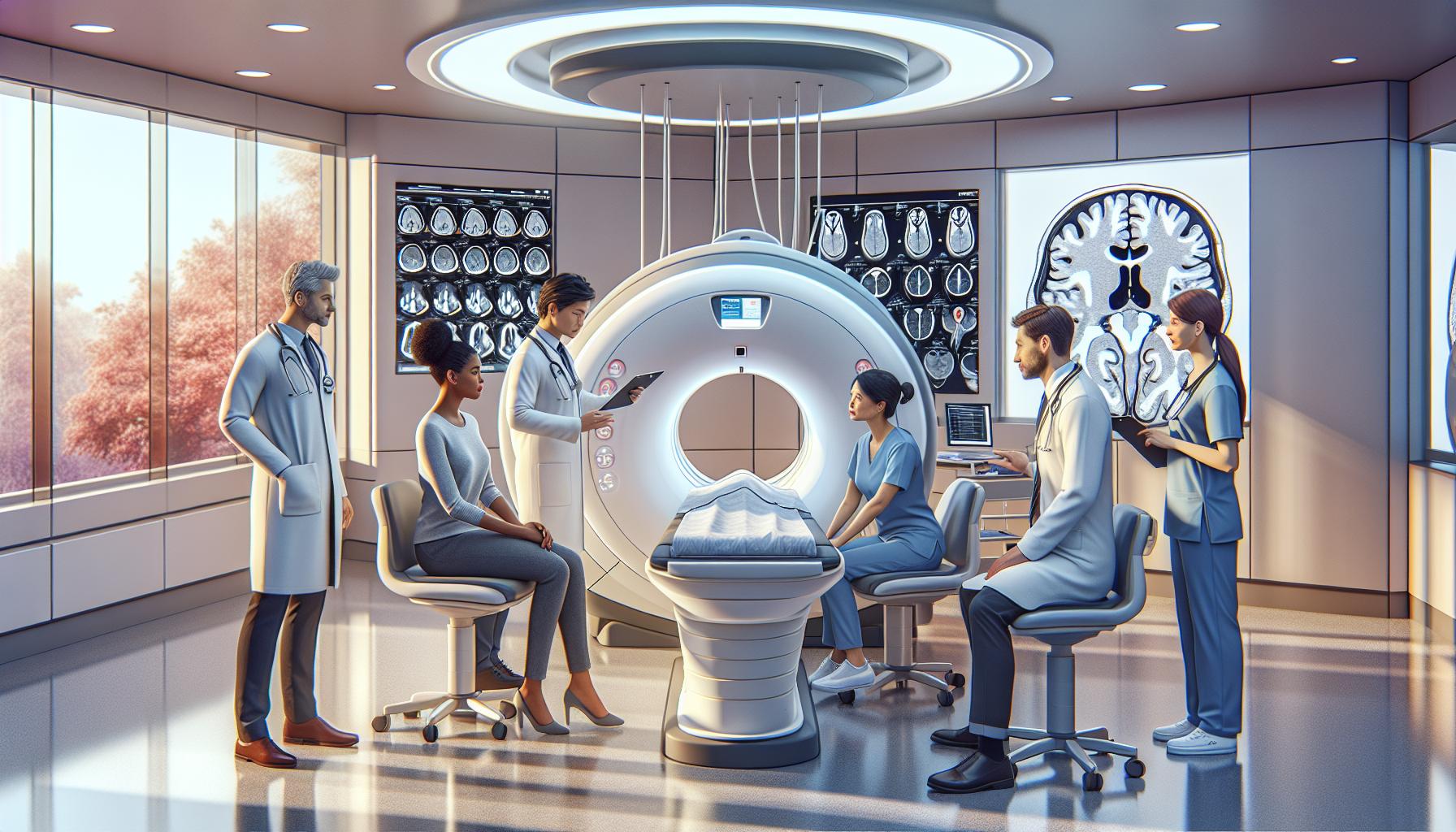
What Multiple Sclerosis Symptoms Lead to Imaging?
Emerging symptoms can often cause significant concern and confusion for those experiencing them. In the context of Multiple Sclerosis (MS), many patients might find themselves facing a range of neurological symptoms that prompt medical evaluation. These symptoms often lead to imaging studies, including CT scans, as healthcare providers seek to uncover the underlying causes. Common presentations that may lead to imaging include sensations of weakness or numbness in limbs, sudden changes in vision (like blurred or double vision), imbalance or coordination issues, and cognitive difficulties such as memory loss or trouble concentrating.
When an individual reports these symptoms, medical professionals must ensure that they are not indicative of other neurological conditions. Although Magnetic Resonance Imaging (MRI) is generally the gold standard for diagnosing MS due to its heightened sensitivity to detecting lesions, a CT scan can serve as an essential preliminary tool. For instance, if a patient presents with sudden vision changes, a CT scan can quickly determine whether an acute issue such as a stroke or tumor is present, which requires immediate intervention. By first eliminating other potential diagnoses, healthcare providers can guide the patient’s diagnostic pathway more effectively and manage their care more precisely.
It’s important for patients to understand that the process of diagnosis is often multifaceted. While CT scans can provide crucial information to rule out alternative conditions and help confirm the presence of MS-related changes in more evident cases, they are not the definitive diagnostic tool for MS itself. This is primarily due to the limitations of CT imaging, as certain hallmark findings of MS lesions may not always be visible or as pronounced when compared to MRI findings.
Ultimately, if you find yourself experiencing any of these concerning symptoms, it is crucial to seek medical advice promptly. Engaging in an open dialogue with your healthcare provider will not only provide clarity on what the next steps might be, but it will also reassure you that you are taking proactive measures toward understanding your health, which can significantly reduce anxiety surrounding the diagnosis process.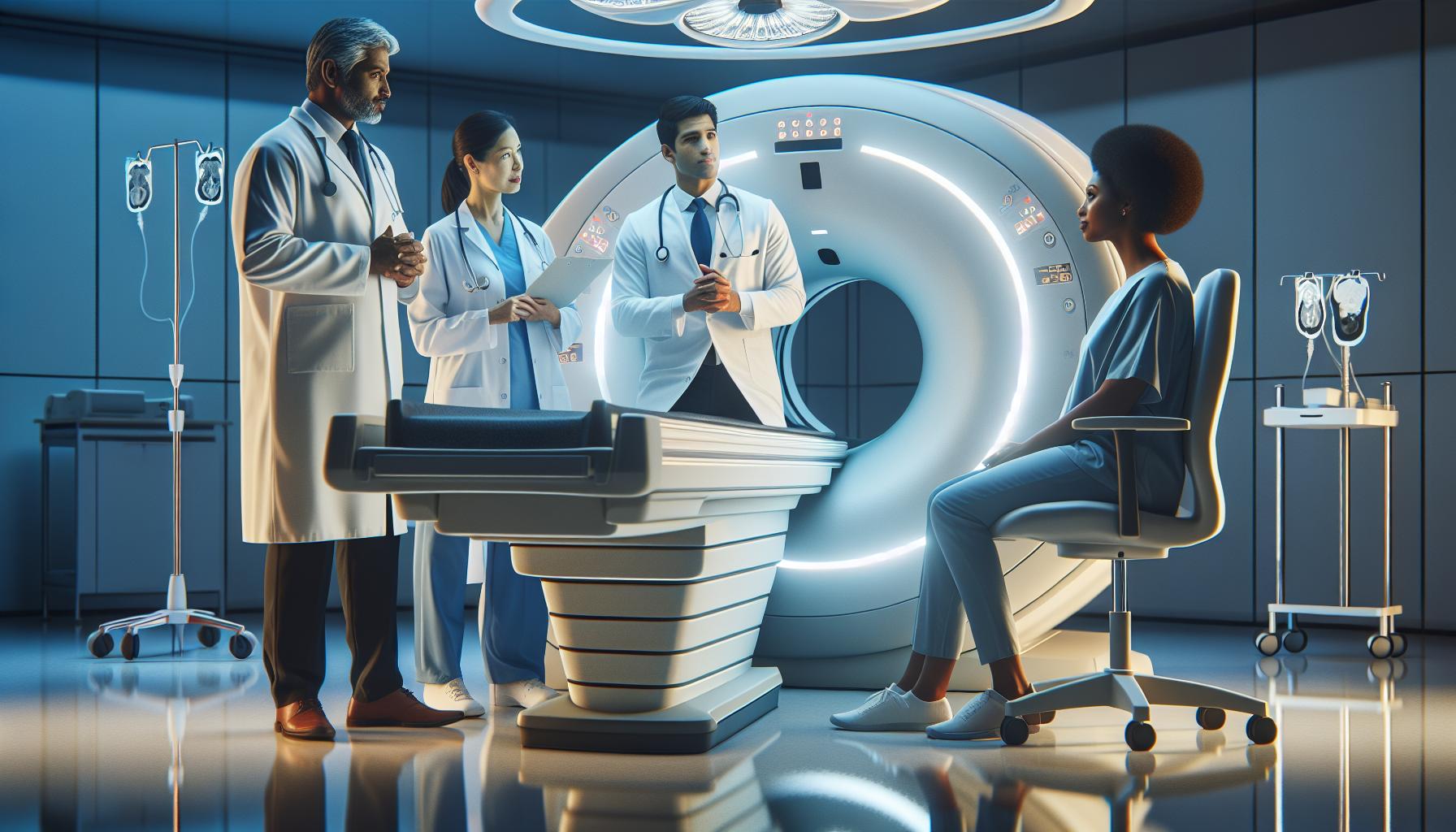
Limitations of CT Scans for MS Detection
Though widely used, CT scans have inherent limitations when it comes to diagnosing Multiple Sclerosis (MS). One of the main challenges is their sensitivity to brain lesions, which are a key feature of MS. While CT scans utilize X-rays to create detailed images of the brain, they are less effective than Magnetic Resonance Imaging (MRI) for identifying the specific lesions that characterize MS. Most MS lesions are small, multifocal, and often located in areas of the brain that may not be adequately visualized on a CT scan. As a result, a significant number of lesions may go undetected, potentially leading to a missed diagnosis or misinterpretation of a patient’s condition.
Another limitation is the ability of CT scans to differentiate between MS lesions and those caused by other neurological diseases. For example, conditions like stroke, tumors, or infections can present similarly and may confuse the interpretation of CT results. This overlap necessitates further investigation, often requiring MRI, which offers greater clarity due to its different imaging techniques and the absence of radiation exposure-a concern for many patients.
Patients also might find the experience of undergoing a CT scan to be anxiety-inducing, given the wait for results and the stakes involved in diagnosing a neurological disease like MS. It’s vital to remember that while CT scans provide valuable initial information, they should not be seen as definitive proof of MS. Instead, they serve more as a tool for ruling out other serious conditions that require urgent attention.
In summary, understanding these limitations allows patients to maintain realistic expectations about the role of CT scans in the diagnostic process. A fruitful dialogue with healthcare providers is essential, enabling patients to explore all available diagnostic options comprehensively. Choosing to follow up on CT results with an MRI can be a wise decision for obtaining a more accurate diagnosis and appropriate treatment plan. Always consult with a healthcare professional for personalized advice regarding diagnostic imaging options and what they may reveal about one’s health condition.
MRI vs. CT Scans: Key Differences in MS Assessment
Understanding the nuances between imaging techniques is vital, especially when navigating the complexities of diagnosing Multiple Sclerosis (MS). While both CT (Computed Tomography) scans and MRI (Magnetic Resonance Imaging) are valuable tools in medical diagnostics, their applications and effectiveness in assessing MS differ significantly.
CT scans utilize X-rays to generate detailed images of cross-sectional slices of the brain, which can be quite effective for identifying larger structural abnormalities such as tumors or significant hemorrhages. However, when it comes to MS, the small, multifocal lesions characteristic of the disease are often too subtle for CT scans to detect. MRI, on the other hand, is superior in visualizing these lesions due to its ability to differentiate between various types of tissue based on their water content. This makes MRI the gold standard for diagnosing MS, as it can reveal much more about the disease’s presence and progression.
In practical terms, if an individual is suspected of having MS, a physician may first perform a CT scan primarily to eliminate other serious conditions. Should any abnormalities or lesions be suspected, an MRI would then be recommended to monitor these more closely. Patients often find MRIs less intimidating than they may have anticipated; the procedure is non-invasive and generally takes about 30 minutes. It’s important to communicate any concerns about the MRI’s magnetic properties or your individual health conditions to your healthcare provider prior to the scan.
When considering the implications of these imaging modalities, it becomes clear that while CT scans can play a supportive role in the diagnostic journey, MRI offers a more comprehensive view of the brain’s condition, particularly for chronic, multifocal lesions indicative of MS. As always, ongoing discussion with healthcare professionals is essential, ensuring that patients can ask questions, express concerns, and fully understand their diagnostic processes. This knowledge empowers patients to engage more actively in their health management, particularly in a complex field like MS.
How CT Scans Help Rule Out Other Conditions
While many may associate CT scans primarily with the detection of tumors or significant injuries, their role in the diagnostic process for Multiple Sclerosis (MS) is centered on exclusion. When symptoms such as neurological deficits, vision problems, or unexplained fatigue arise, a healthcare provider may first recommend a CT scan as a means to rule out other serious conditions that could masquerade as MS. This strategic approach can provide clarity and peace of mind to both patients and physicians alike, as they work together to navigate the complex landscape of neurological health.
CT scans are particularly adept at identifying acute issues such as hemorrhages, strokes, or structural abnormalities within the brain that might present with symptoms similar to those of MS. For example, if a patient experiences sudden vision loss or severe headaches, a CT scan can quickly detect whether the underlying cause is related to a brain tumor or other intra-cranial pathologies that require immediate intervention. By effectively ruling out these conditions, patients can avoid unnecessary probing into misdiagnosed MS and focus on the appropriate course of action.
Moreover, the timeliness of a CT scan can be advantageous. The imaging process is typically quick and the results are available almost immediately, enabling physicians to make informed decisions without delay. This could be pivotal for patients experiencing acute or debilitating symptoms. Understanding the outcome of a CT scan often alleviates anxiety as patients receive confirmation that serious conditions have been accounted for, allowing them to explore further testing, such as MRI, with a sense of security regarding their health status.
While CT scans have undeniable utility in the initial phases of diagnosis, it’s essential to remember that they are one part of a broader diagnostic toolkit. Following a CT scan, if the results are inconclusive or do not align with clinical suspicions of MS, further imaging-such as MRI-may still be necessary to gain a deeper insight into the condition. This layered approach emphasizes the importance of ongoing consultation with healthcare professionals, who can provide guidance tailored to individual cases and ensure that all avenues are explored in the quest for an accurate diagnosis.
Preparing for a CT Scan: What to Expect
Preparing for a CT scan can feel daunting, especially when navigating the complexities of potential Multiple Sclerosis (MS) symptoms. However, understanding the procedure and what to expect can significantly alleviate anxiety and provide a smoother experience. A CT scan, or computed tomography scan, uses X-ray technology to create detailed images of the brain and other internal structures, helping healthcare professionals rule out conditions that may mimic MS.
When you schedule a CT scan, your healthcare provider will typically outline specific preparation steps. It’s important to follow these instructions carefully to ensure the most accurate results. Commonly, you may be advised to refrain from eating or drinking for a few hours before the scan to prevent any complications, especially if a contrast dye will be used to enhance image clarity. If you’re taking medications, discuss with your doctor whether you should take them on the day of the scan.
Upon arrival at the imaging facility, you will be greeted by the staff, who will guide you through the process. You may be asked to change into a hospital gown and remove any jewelry or accessories that could interfere with the imaging. The CT scan itself is quick-typically taking only a few minutes. You’ll lie down on a narrow table that moves through a large, doughnut-shaped machine, which may seem intimidating but is designed for comfort and efficiency. During the scan, it’s essential to remain still and follow any breathing instructions given by the technician to ensure the images are clear.
After the scan, you can generally resume your normal activities immediately. Results will usually be available shortly thereafter, with your doctor discussing them with you in a follow-up appointment. Understanding that the CT scan is just one tool among many in the diagnostic process helps frame its role in your overall health assessment. Always remember that open communication with your healthcare team is crucial-don’t hesitate to voice your concerns or questions as you navigate this important step in understanding your health.
Evaluating the Role of Advanced Imaging Techniques
In the ever-evolving landscape of medical imaging, advanced techniques are pivotal in enhancing our understanding of conditions like Multiple Sclerosis (MS). While CT scans offer valuable insights into the structure of the brain and can help rule out other neurological disorders, they have limitations when it comes to visualizing the subtle changes in brain tissue associated with MS. This is where advanced imaging techniques come into play, providing a more nuanced view that can significantly impact diagnosis and treatment planning.
One of the most notable advancements is Magnetic Resonance Imaging (MRI), which excels in detecting MS lesions due to its superior contrast resolution. MRIs can visualize demyelination-an essential factor in MS diagnosis-with remarkable precision. This capability allows healthcare providers to monitor disease progression continually and evaluate the effectiveness of treatments over time. Furthermore, advancements in MRI technology, such as high-resolution imaging and functional MRI, enable doctors to assess brain activity and changes in blood flow, offering a comprehensive view of the disease’s effects.
In addition to MRI, newer modalities like Positron Emission Tomography (PET) are increasingly being integrated into the diagnostic process. PET scans can exhibit metabolic changes in the brain that occur prior to visible structural changes seen on traditional imaging techniques. This might provide early detection of MS and inform treatment strategies before significant damage has occurred.
While advanced imaging techniques are powerful tools in the detection and management of MS, they should not be viewed in isolation. The interpretation of these imaging results is complex and requires expertise. Thus, close collaboration with a neurologist or a specialist experienced in MS is crucial to ensure that imaging findings are integrated with clinical symptoms and patient history. This multidisciplinary approach fosters a more personalized healthcare experience, ultimately leading to better outcomes for individuals navigating the challenges of Multiple Sclerosis.
Analyzing CT Scan Results: What They Mean for MS
A CT scan can be a critical element in the diagnostic process for Multiple Sclerosis (MS), though it is not the definitive tool for identifying the disease. When interpreting the results of a CT scan in the context of suspected MS, it’s essential to understand what the images can reveal and what they can’t. A CT scan primarily provides structural images of the brain. It can help identify other conditions that may mimic MS symptoms, such as brain tumors, strokes, or other neurological disorders. This differential diagnosis is vital because it allows healthcare providers to rule out alternative explanations for the patient’s symptoms.
Results from a CT scan often show areas of white matter changes or lesions indicative of demyelination; however, these findings can be less pronounced than on MRI scans, which are the gold standard for diagnosing MS. The subtle lesions that characterize MS may appear as non-specific changes on CT images, making it challenging to confirm MS solely based on this imaging. For many patients, this can lead to a degree of uncertainty regarding their diagnosis, which is why an informed and patient-focused approach is necessary when discussing CT findings.
It’s also important to remember that no single imaging test can provide a definitive MS diagnosis. The results should always be interpreted in conjunction with a patient’s medical history, symptoms, and possibly further testing, such as MRI or lumbar puncture analyses. Engaging with a neurologist or an MS specialist is crucial, as they can correlate the imaging findings with clinical assessments to reach a well-rounded conclusion. Finally, understanding that CT scan results are just one piece of the puzzle can enhance patient reassurance as they navigate through the complexities of MS diagnosis and treatment.
The Importance of Specialist Consultation in MS Diagnosis
The journey to a definitive diagnosis of Multiple Sclerosis (MS) can often feel overwhelming, and it is crucial to know that you don’t have to navigate it alone. Consulting with a specialist, particularly a neurologist or an MS expert, can greatly enhance your understanding and provide clarity during this challenging time. Specialists are trained to interpret not only the imaging findings, such as those from CT scans, but also the intricate interplay of your symptoms and medical history. Their expertise allows for a comprehensive evaluation, which is vital because understanding MS can require a nuanced approach that goes beyond standard imaging results.
During your consultation, it’s essential to engage actively in the discussion about your concerns and the results of your imaging tests. Specialists can help decipher the often complex images produced by CT scans, which may show non-specific changes rather than clear indicators of MS. By collaborating with your healthcare provider, you gain access to a wealth of knowledge and support, enabling a thorough exploration of diagnostic possibilities. In addition, specialists can recommend further diagnostic testing, such as MRIs or lumbar punctures, if needed, which are pivotal in confirming an MS diagnosis.
Moreover, involving a healthcare professional from the start can facilitate a personalized care plan tailored to your unique presentation and lifestyle. This approach not only aids in addressing your MS symptoms more effectively but also fosters an environment where you feel listened to and understood. As MS often presents differently from person to person, leveraging the expertise of a specialist can make a significant difference in your treatment journey. Your concerns are valid, and with the right support, you can navigate the complexities of MS diagnosis with greater confidence and reassurance.
In summary, the role of a specialist in diagnosing MS cannot be overstated. They provide a thorough understanding of your condition, guide the interpretation of imaging tests, and create a treatment plan that aligns with your health needs. Engaging with a neurologist or MS expert offers a pathway to clarity amidst confusion, empowering you to take an active role in your health management.
Cost Considerations for MS Diagnostic Imaging
The cost of diagnostic imaging for Multiple Sclerosis (MS) can vary significantly based on several factors, including the type of imaging required, the facility where the procedure is performed, and whether you have insurance coverage. Understanding these costs is crucial in managing both your health and your finances effectively. A CT scan, which some physicians may use as an initial imaging modality, can range widely from $300 to $3,000 or more, depending on location, facility type, and additional services such as radiologist fees for interpreting the scans.
Before scheduling your CT scan, it’s wise to discuss the procedure with your healthcare provider. They can help you understand the specific imaging tests recommended and why a CT scan might be necessary in your case. If you have health insurance, check with your insurer about coverage for MS diagnostic imaging, as many plans cover these essential diagnostic tools. Be aware that if you are referred to a facility that is out of network, costs can increase substantially, so selecting a provider aligned with your insurance network can lead to significant savings.
Additionally, if you are uninsured or concerned about costs, many facilities offer payment plans or sliding scale fees based on income. Don’t hesitate to ask the imaging center about any financial assistance programs they may offer. It’s also important to consider the potential expenses of follow-up consultations with specialists who interpret these scans. Engaging transparently in discussions about costs with your healthcare provider can alleviate potential financial burdens, helping you to focus more on your health and less on financial stress.
Understanding your financial options may help you navigate the complexities of MS diagnostic imaging. Engaging with your healthcare team about any concerns can empower you to make informed decisions and potentially pave the way for tailored solutions that accommodate both your medical needs and financial situation.
The Future of Imaging in Multiple Sclerosis Treatment
As the landscape of healthcare evolves, so too does the potential for groundbreaking advancements in imaging techniques that can transform the management of Multiple Sclerosis (MS). Given the complex nature of MS and its variable symptoms, there is an increasing push towards utilizing advanced imaging modalities to enhance diagnostic accuracy and treatment monitoring. Emerging technologies promise not only to improve the precision of MS diagnoses but also to provide insights into disease progression and response to therapies.
One of the most exciting areas of development lies in the integration of advanced MRI techniques, such as diffusion tensor imaging (DTI) and functional MRI (fMRI). These modalities allow clinicians to visualize white matter integrity and brain activity, offering a deeper understanding of neurological changes associated with MS. As these imaging techniques become more available and refined, they can complement traditional CT scans, which, while useful, often fall short in detecting subtle brain lesions characteristic of MS.
Personalized Imaging Approaches
A pivotal shift towards personalized imaging methodologies is also underway. Personalized imaging takes into account individual patient factors-such as genetic background, symptom profile, and disease history-to tailor imaging protocols. This personalized approach can optimize the imaging process, reduce unnecessary exposure to radiation, and enhance overall diagnostic yield. With advances in artificial intelligence, there’s the promise of automating image analysis, which can significantly enhance the speed and accuracy of MS diagnosis and treatment strategies.
Moreover, mobile and portable imaging devices are beginning to emerge, providing more accessible options for patients. These innovations could mean that screenings are not confined to specialized centers, allowing for early identification and timely intervention, crucial during the initial disease phases where early diagnosis can lead to better long-term outcomes.
In summary, the future of imaging in MS treatment is bright, marked by technological innovations aimed at enhancing patient care and disease management. As these imaging techniques evolve, they promise to reduce the anxiety associated with MS diagnoses by providing clearer, more comprehensive insights into this multifaceted disease. It’s essential to stay informed about these advancements and discuss with healthcare providers how they might influence individual treatment plans, ensuring that every patient receives the best possible care tailored to their unique needs.
Patient Experiences: Navigating MS Diagnosis through Imaging
For many individuals facing the possibility of Multiple Sclerosis (MS), the imaging process can seem daunting, heightening feelings of uncertainty and anxiety. It’s important to remember that CT scans, while not the primary tool for diagnosing MS, can provide critical insights into your neurological health. As you prepare for an imaging appointment, understanding what to expect can help alleviate some of those concerns and restore a sense of control.
A CT scan-short for computed tomography-utilizes X-rays to create detailed pictures of the body, including the brain. This imaging technique can help differentiate between MS and other medical conditions that may cause similar symptoms, such as tumors or stroke. If your healthcare provider recommends a CT scan, it’s often part of a comprehensive diagnostic process. Here are a few key points to consider for your journey through imaging:
- Preparation is Key: Before your CT scan, you may be advised to avoid food or drink for a few hours. This ensures that your stomach is empty, which can improve imaging quality. Always clarify any specific instructions with your healthcare provider in advance.
- What to Expect: During the scan, you’ll lie on a table that moves through the CT scanner. The procedure typically lasts only a few minutes, and you might hear clicking sounds as the machine takes images. Remember to remain still during this time to achieve the best results.
- Results and Follow-Up: After the scan, a radiologist will analyze the images, looking for signs of lesions or abnormalities. It’s common to feel anxious while waiting for results. Your provider will discuss the findings with you promptly, helping to guide the next steps in your care.
Understanding your experience during this process can significantly reduce anxiety. Many patients find comfort in knowing that imaging plays a crucial role in determining not only if they have MS but also in ruling out other potential conditions that could mimic its symptoms. Remember, every person’s experience is unique, and it’s entirely normal to have questions or concerns. Don’t hesitate to communicate openly with your healthcare team; they are there to support you and provide clarity throughout your diagnostic journey.
As advances in imaging technologies continue to emerge, patients can expect more precise and less invasive options for monitoring their health. Engaging with your healthcare provider about the latest advancements can empower you, ensuring that your path to diagnosis and treatment is as informed and reassuring as possible.
FAQ
Q: Can a CT scan detect multiple sclerosis (MS)?
A: While a CT scan may reveal changes in the brain, it is not the most effective tool for diagnosing multiple sclerosis. MRI is generally preferred due to its superior ability to detect the lesions characteristic of MS.
Q: What symptoms may lead to an MS diagnosis via imaging?
A: Symptoms such as vision problems, numbness, weakness, and coordination issues may prompt healthcare professionals to recommend imaging tests to investigate potential MS. Early identification of such symptoms is crucial for timely diagnosis.
Q: How effective are CT scans in ruling out multiple sclerosis?
A: CT scans can help rule out other conditions that may mimic MS symptoms, such as tumors or strokes. However, they are less effective than MRIs in specifically identifying MS-related lesions.
Q: Are there any risks associated with CT scans for MS detection?
A: The main risk of CT scans is exposure to ionizing radiation. While the radiation levels are typically low, it’s essential to weigh the benefits against potential risks, especially when multiple scans may be required.
Q: How do CT scans compare to MRIs in detecting MS?
A: CT scans provide less detailed images of soft tissues than MRIs, making MRIs more effective for identifying the demyelination and lesions seen in MS. For a comprehensive MS assessment, MRIs are usually recommended.
Q: What should patients expect during a CT scan for possible MS?
A: During a CT scan, patients lie on a table that slides into a machine. It’s quick, usually only taking about 10 minutes, and involves minimal discomfort. Patients may need to remain still for optimal images.
Q: How can CT scan results influence MS treatment plans?
A: While CT scan results alone are usually insufficient for an MS diagnosis, they can provide context for other tests. If lesions are detected or other conditions are ruled out, it can guide neurologists in formulating treatment plans.
Q: What advancements are there in imaging for MS besides CT and MRI?
A: Advanced imaging techniques, such as PET scans and diffusion tensor imaging, are being explored for detecting MS more accurately. These innovations may provide deeper insights into the progression of the disease and improve patient management.
Final Thoughts
If you’re concerned about whether a CT scan can help detect Multiple Sclerosis (MS), it’s crucial to remember that early diagnosis can significantly impact treatment and management options. A CT scan provides detailed images that can assist healthcare professionals in identifying lesions associated with MS, enabling timely intervention. If you have lingering questions or are unsure about the next steps, consider reaching out to a healthcare provider who can guide you through your concerns and provide personalized advice.
For more insights on medical imaging and conditions like MS, check out our articles on CT Scans Explained and Understanding MS Symptoms. Don’t forget to subscribe to our newsletter for the latest updates and expert tips on health management. Taking charge of your health is essential-let’s explore the information that empowers you to make informed decisions. Join our community, share your thoughts, or ask questions in the comments below. Every step you take brings you closer to clarity and peace of mind.

